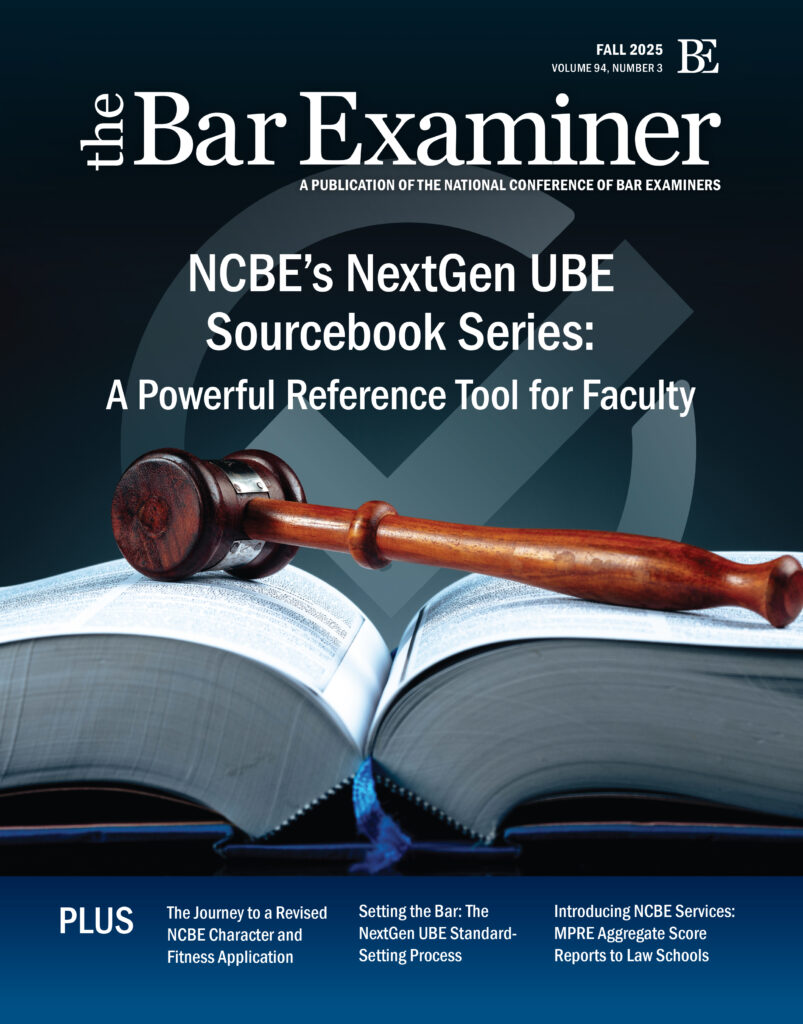
The Next Generation of the Bar Exam: NCBE’s Board of Trustees Approves the Recommendations of the Testing Task Force
It’s official! The NCBE Board of Trustees approved the recommendations of the Testing Task Force, and work is already under way to begin developing the new bar exam.
The recommendations, which are set out in Overview of Recommendations for the Next Generation of the Bar Examination at nextgenbarexam.ncbex.org/reports/, are based on the qualitative and quantitative data the Task Force gathered during Phases 1, 2, and 3 of its three-year study, including input from the many stakeholders who participated. The recommendations were developed in accord with the professional standards for high-stakes testing1 and are grounded in the purpose of the bar exam, which is to protect the public by helping to ensure that those who are newly licensed possess the minimum knowledge and skills to perform activities typically required of an entry-level lawyer.
The Testing Task Force sunsetted at the end of March, and the Implementation Steering Committee is now taking over. So, although this is the Task Force’s final update, quarterly updates will continue from the Implementation Steering Committee. We have also created a dedicated website, nextgenbarexam.ncbex.org/, to keep stakeholders informed and involved as the process unfolds and to ensure a smooth transition to the new exam for jurisdictions, candidates, and law schools.
How Will the Exam Change?
The biggest changes will be to the structure and format of the bar exam: an integrated exam design will be used to measure both knowledge and skills holistically using a combination of stand-alone questions and item sets.
An item set is a collection of test questions that are presented as a unit and based on a single scenario or stimulus. The questions within an item set can be either of the same format (e.g., multiple-choice, essay, or short-answer questions) or of different formats.
An integrated exam design reflects a fundamental shift from the current exam’s structure of three discrete components (MBE, MEE, and MPT) covering specific knowledge and skills using the same question format within each component.
NCBE will be developing prototypes of item sets later this year so that stakeholders can get a better idea of what the new exam will look like.
What Will Be Assessed on the New Exam?
The knowledge and skills to be assessed in the new exam are those of foundational importance and common to numerous practice areas, which is consistent with the regulatory framework of a general license to practice law.
The scope of what will be included within the eight Foundational Concepts & Principles (FC&P) and the seven Foundational Skills will be carefully aligned with minimum competence for entry-level practice and set out in the Test Content Specifications, which will be developed as one of the first steps of implementing the recommendations.
The Foundational Skills may be assessed in the context of the FC&P, which examinees are expected to know, or in other legal contexts where a closed universe of appropriate legal resources (e.g., statutes, cases, rules, regulations) will be provided to examinees. For example, we anticipate that an MPT-type library containing resources specific to the task examinees are asked to complete may be provided. The intent is to make the exam more realistic and to reduce the amount of legal knowledge examinees must learn for the exam.
| Foundational Concepts and Principles | Foundational Skills |
|
|
What About the MPRE?
The Multistate Professional Responsibility Examination (MPRE) will remain a stand-alone exam that is administered separately from the bar exam. Stakeholders recognize the importance of professional responsibility (it was ranked as the most important knowledge area on the 2019 practice analysis) and value its separate assessment as a core piece of ensuring public protection and trust in the integrity of the legal profession. Because of its importance, professional responsibility may serve as the context for assessing Foundational Skills (e.g., legal analysis, client counseling and advising) on the new bar exam, but the applicable rules or other legal resources will be provided to examinees.
How Will the New Exam Be Scored?
A compensatory scoring model will be used to produce a single combined score for making admission decisions, which is consistent with the use of an integrated exam design and the interconnected nature of the knowledge and skills being measured. A compensatory scoring model is currently used for the Uniform Bar Examination (UBE) and by most non-UBE jurisdictions as well. A single, combined score allows an examinee’s areas of strength to compensate for areas of weakness and reflects the examinee’s overall proficiency in the competencies being measured.
How Will the New Exam Be Administered?
The next generation of the bar exam will be administered in person and delivered by computer, either at computer testing centers managed by appropriate vendors or on examinees’ laptops at jurisdiction-managed testing sites. Although remote administration of the current bar exam has been offered as an emergency option during the COVID-19 pandemic because some jurisdictions could not safely administer the exam in person, uniform testing conditions and accessibility for all examinees can be best ensured by in-person administration. However, as we explore options for computer delivery of the next generation of the bar exam, the adaptability to switch to remote administration in the event of disruptions to in-person testing is a factor we will be considering.
Will the Timing of Administration of the New Exam Change?
The exam will continue to be given as a single event at or near the point of licensure, although jurisdictions may still permit students to test in their final semester of law school, as some currently do. This timing is most consistent with the purpose of the bar exam in that it places measurement of minimum competence as close in time to the award of a license as possible.
A multi-event approach, where components or modules of the exam would be administered at separate times, was discussed by stakeholders during Phase 1 and Phase 3 of the Task Force’s study. While some favored a multi-event approach, primarily because it would permit testing of legal doctrine closer in time to when students learned the content in law school, others expressed concerns about potential negative effects such as interfering with internship opportunities, impacting law school curricula, adding the stress of taking a high-stakes exam during law school, creating multiple “hurdles” for admission, and potentially increasing costs for examinees to prepare for and travel to multiple administrations of the exam. Ultimately, the Task Force concluded that a single-event administration is more consistent with the use of an integrated exam design.
How Long Before the New Exam Is Implemented?
We anticipate that it will take four to five years to develop and administer the new integrated bar exam. The major steps of implementation will include
- developing content specifications identifying scope of coverage;
- drafting new types of questions for integrated testing of knowledge and skills;
- ensuring accessibility for examinees with disabilities;
- field-testing new item formats and new exam content;
- conducting analyses and review to ensure fairness for diverse populations of examinees;
- evaluating options for computer delivery of the exam;
- reviewing procedures for grading constructed response items (e.g., essays);
- establishing scoring processes and psychometric methods for equating/scaling scores;
- developing test administration policies and procedures;
- assisting jurisdictions to prepare and supporting them in activities such as setting passing score requirements and amending rules to align with changes to the exam; and
- providing study materials and sample test questions to help examinees prepare.
Implementation will be conducted in a systematic, transparent, and collaborative manner, informed by the input from and participation by stakeholders, and guided by best practices and the professional standards for high-stakes testing.
The Overview of Recommendations for the Next Generation of the Bar Examination; detailed reports of the research conducted during Phases 1, 2, and 3 of the study; and a comprehensive report of the Task Force’s study and basis for the recommendations are available at nextgenbarexam.ncbex.org/reports/. A video presentation discussing the recommendations is also provided at nextgenbarexam.ncbex.org/presentations/, and accompanying FAQs are provided at nextgenbarexam.ncbex.org/faqs/.
Note
- The professional standards for high-stakes testing are delineated in the Standards for Educational and Psychological Testing (AERA, APA, NCME, 2014). (Go back)
NCBE’s Testing Task Force
The National Conference of Bar Examiners’ Testing Task Force, appointed by NCBE in January 2018, was charged with undertaking a three-year study to ensure that the bar examination continues to test the knowledge, skills, and abilities (KSAs) required for competent entry-level legal practice in a changing profession. The Testing Task Force’s study was completed at the end of 2020, and the Task Force’s recommendations were approved by the NCBE Board of Trustees in January 2021.
nextgenbarexam.ncbex.org
Email: nextgenbarexam.ncbex.org/contact/
Linkedin: linkedin.com/showcase/next-gen-bar-exam
Twitter: @NextGenBarExam
Facebook: facebook.com/NextGenBarExam
This article originally appeared in The Bar Examiner print edition, Spring 2021 (Vol. 90, No. 1), pp. 16–18.
Contact us to request a pdf file of the original article as it appeared in the print edition.







